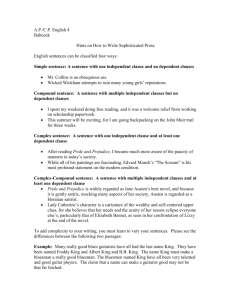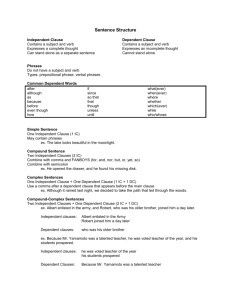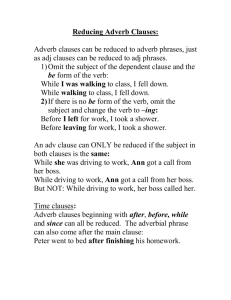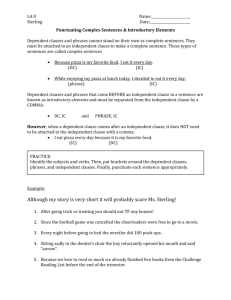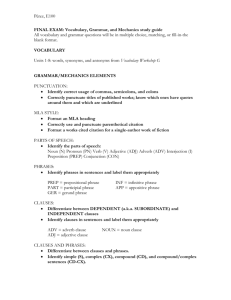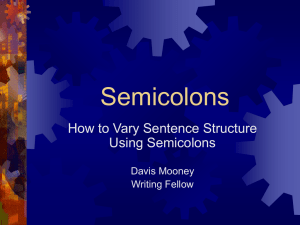Name Date ___ Block ______ Mid-term Exam Review I. Poetry
advertisement
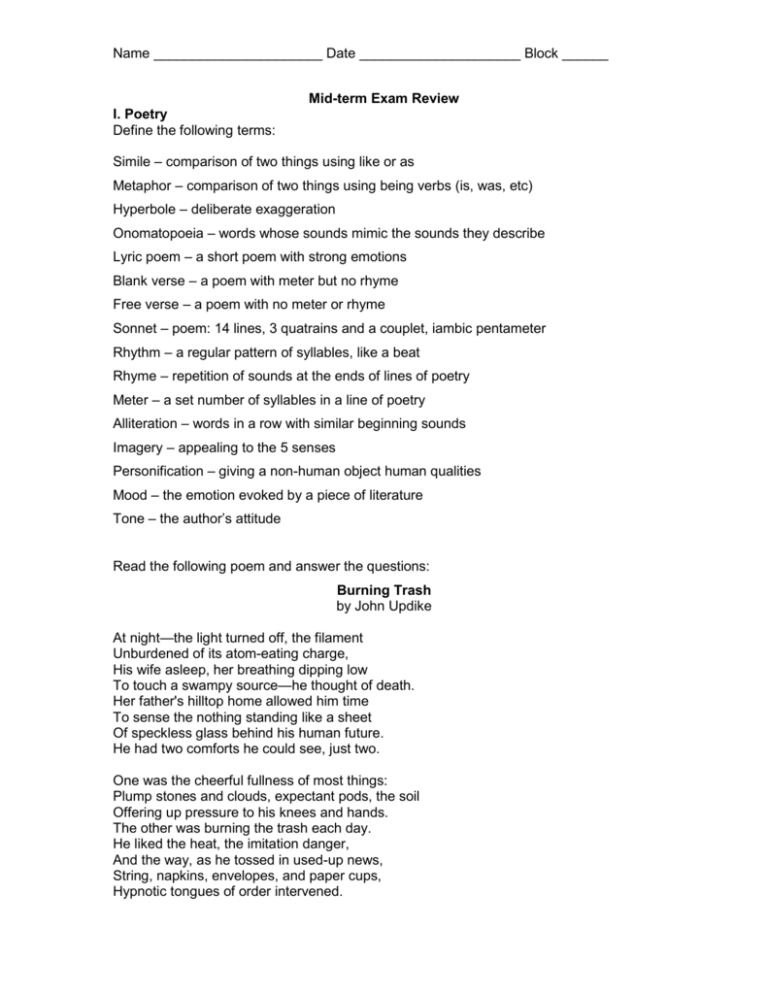
Name ______________________ Date _____________________ Block ______ Mid-term Exam Review I. Poetry Define the following terms: Simile – comparison of two things using like or as Metaphor – comparison of two things using being verbs (is, was, etc) Hyperbole – deliberate exaggeration Onomatopoeia – words whose sounds mimic the sounds they describe Lyric poem – a short poem with strong emotions Blank verse – a poem with meter but no rhyme Free verse – a poem with no meter or rhyme Sonnet – poem: 14 lines, 3 quatrains and a couplet, iambic pentameter Rhythm – a regular pattern of syllables, like a beat Rhyme – repetition of sounds at the ends of lines of poetry Meter – a set number of syllables in a line of poetry Alliteration – words in a row with similar beginning sounds Imagery – appealing to the 5 senses Personification – giving a non-human object human qualities Mood – the emotion evoked by a piece of literature Tone – the author’s attitude Read the following poem and answer the questions: Burning Trash by John Updike At night—the light turned off, the filament Unburdened of its atom-eating charge, His wife asleep, her breathing dipping low To touch a swampy source—he thought of death. Her father's hilltop home allowed him time To sense the nothing standing like a sheet Of speckless glass behind his human future. He had two comforts he could see, just two. One was the cheerful fullness of most things: Plump stones and clouds, expectant pods, the soil Offering up pressure to his knees and hands. The other was burning the trash each day. He liked the heat, the imitation danger, And the way, as he tossed in used-up news, String, napkins, envelopes, and paper cups, Hypnotic tongues of order intervened. Name ______________________ Date _____________________ Block ______ 1. Write a 3-5 sentence summary of the poem. At night, the speaker thinks about his father-in-law’s death. He thinks about the house his father-in-law lived in. Two things comfort him: thinking about gardening and thinking about burning trash 2. Write down any examples of figurative language and what type of figurative language each is (ex. Line 10: “I was so hungry I could eat a horse!” hyperbole). L. 1-2 “Unburdened of its atom-eating charge” personification L. 14-15 “And the way…paper cup” imagery L. 16 “Hypnotic tongues of order intervened” personification 3. Explain the meaning of each example of figurative language (ex: The poet means that he is very, very hungry). L. 1-2: a light is turned off L. 14-15: provides a visual of the trash being burnt L. 16: flames burning the trash 4. What is the tone of the poem (the author’s attitude towards the subject)? What is the mood (how the poem makes the reader feel)? Mood: somber, serious Tone: melancholy 5. What is the poem’s theme (remember, a theme is NOT a single word)? Memories can comfort us in times of grief 6. What type of poem is this (free verse, blank verse, sonnet, ode, etc.)? Blank verse II. Grammar Definition: A clause is a group of words that contains a subject and a predicate (verb). There are two types of clauses, independent and subordinate. An independent clause expresses a complete thought and can stand alone as a sentence. Examples: Mr. Haloran won twelve dollars last week. Everybody passed the geometry test. Mike, Carol, and Stacie all enjoyed the movie. A subordinate clause CANNOT stand alone as a sentence. It can act as an adjective, adverb, or noun. It is preceded by an introductory that relates it to another part of the sentence. Examples: Julie, who dyed her hair pink and yellow, shocked everyone at the party. The clause is used as an adjective and is introduced by “who.” If the rain every stops, we’ll leave for the game. Name ______________________ Date _____________________ Block ______ The clause is used as an adverb and is introduced by “If.” After he accidentally blew up the chemistry lab, Herbert thought that he would be expelled from school. The first clause is an adverb and is introduced by “After.” The second clause is a noun and is introduced by the word “that.” *** As you can see, there are three types of subordinate clauses, nouns, adjectives, and adverbs. They operate in the same manner as single-word parts of speech, and, like prepositional and verbal phrases, act as single units. They modify or change other words or take the place of words. Adverb clauses are introduced by the subordinating conjunctions after, although, as as if, as long as, as much as, because, before, even, even though, if, how, in order that, once, provided (that), since, than, so that, that, unless, until, where, why, while, though, when. Adjective clauses are introduced by the relative pronouns that, who, whom, whose, which. ADVERB CLAUSES Remember that adverb clauses are dependent clauses that modify verbs, adjectives, or other adverbs. In other words, adverb clauses act just like single-word adverbs or adverb phrases! Like an adverb, the clause also answers the questions when, where, why, how, or to what degree. Examples: Hide the candy where you will be able to find it. The clause modifies “hide” as it tells where. We left before the rain started. The clause modifies “left” as it tells when. Since you are here, you may as well stay. The clause modifies “may stay” as it tells why. He cried as if his heart would break. The clause modifies “cried” as it tells how. HINT: A good way to test for most adverb clauses is to see if they can be moved around in the sentence. She screamed when she saw the dog. → When she saw the dog, she screamed. Because he was asked to, he went to the store. → He went to the store because he was asked to. **SPECIAL NOTE: “Than” and “as” often introduce clauses with some of their parts understood and dropped out. Jack can run faster than I. “than I can run” = dependent clause He can cook better than she. “than she can cook = dependent clause Tom finished his quiz as fast as Joe. “as fast as Joe finished” = dependent clause ADJECTIVE CLAUSES Name ______________________ Date _____________________ Block ______ Remember that adjective clauses are also called relative clauses. These clauses do what single-word adjectives or adjectives phrases do: they modify or change nouns or pronouns. Examples: Everyone whose name was called received one hundred dollars. The clause modifies “Everyone.” The girl who had brown eyes selected a deep green dress that was covered in sequins. The first clause modifies “girl” and the second modifies “dress.” Cats, who are extremely independent, make terrific pets. The clause modifies “cats.” All who attended the film had a terrific time. The clause modifies “all.” **NOTE: Sometimes, the relative pronoun is omitted but everyone who knows, knows that the pronoun is understood to be there! Example: The boy she hit fell to the ground. “Whom” is left out. “That” = informal Judith is a person everyone admires. “Whom” is left out. “That” = inormal Both underlined clauses are still dependent clauses. See your worksheet for the introductory words to adjective clauses. These clauses are sometimes introduced by “when” or “where.” Occasionally, the introductory word acts as the subject of the dependent clause. Read each sentence and identify the clause in bold as adjective or adverb. 1. When you went into the cellar, did you notice the new shelf? ADV 2. I cleaned the cupboards while Henry washed the woodwork. ADV 3. At the zoo, Susan had to stand on tiptoe so that she could see the animals. ADV 4. He cried because he was lonelier than he could express. ADV 5. Nobody can become an expert golfer unless he really practices. ADV 6. Bring in the clothes before it begins to rain. ADV 7. The murderer in the horror film killed his next victim as I sat breathlessly watching. ADV 8. While Lancer lay on the office floor, Bat calmly ate her dinner. ADV 9. As much as I like you, I still think you’re a less-than-desirable companion. ADV 10. The coat that Joan is wearing is made of velvet that has been imported from Italy. ADJ 11. Here is the place where the treasure is buried. ADJ III. Types of Sentences Name ______________________ Date _____________________ Block ______ A simple sentence consists of one independent clause and no subordinate clauses. EXAMPLE: Joe likes to hunt. A compound sentence consists of two or more independent clauses and no subordinate clauses. EXAMPLE: Joe works in a manure factory downtown, and his wife Joan works in a perfume factory nearby. OR: Joe works downtown in a manure factory; his wife Joan works in a perfume factory nearby. A complex sentence consists of one independent clause and one or more subordinate clauses. EXAMPLE: Mary is the person who dozes off continuously during church. A compound-complex sentence consists of two or more independent clauses and one subordinate clause. EXAMPLE: John climbed to the top of the tree, but Sue, who was a bit clumsy, fell off half way up. Identify each sentence below with S for simple, CD for compound, CX for complex, or CD-CX for compound-complex. 1. My aunt has joined an investment club that investigates and buys stocks, and she has made a little profit already. ____CD____ 2. The Great Barrier Reef forms a natural breakwater for the coast of northeast Australia and attracts tourists from all over the world. ____S____ 3. Just thinking is not enough; you must think of something. ___CD_____ 4. We had gone only a little way into the cave before our flashlight went out. ____CX____ 5. Although snow was predicted, the temperature has stayed above freezing, so rain is falling instead. ____CD-CX____ 6. Is the universe expanding, or is it contracting? ___CD_____ 7. After the holiday dinner is over, my brother washes dishes and I dry them. ___CD-CX_____ 8. The last car of the poky old freight train is just now coming into view. ___S_____ 9. Everyone who saw the movie has liked it, so I’m going tonight. ____CD____ 10. We tried hard, but the job was harder than we expected. ___CD____ III. Reading Comprehension Read the passage and use context clues to answer the questions. Chicago – The Windy, Fast, Murderous City of the Midwest Chicago, Illinois is nicknamed the Windy City. Michigan Avenue, home to Water Tower Place, Tiffany’s, and multiple Gap stores, can be a wind tunnel with people clutching bags and hair as a mighty wind whips down the street. But it did not gain its moniker for the high velocity of winds – the fact is that back in 1893, during the World’s Columbian Exposition in Chicago, Name ______________________ Date _____________________ Block ______ New York Sun editor Charles Dana, dubbed the city the Windy City because he was tired of hearing Chicagoans boast about the Exposition. The history of Chicago is full of oddities. For example, the two lions guarding the entrance to the Art Institute were designed by a dentist turned sculptor, Edward L. Kenrys. The first automobile race ever seen in the United States was held in Chicago in 1895 – the winner, J. Frank Duryea, drove an average of 7 ½ miles per hour. On the more macabre side of life, in rd 1896, Dr. Herman Mudgett built a home at 63 and Wallace that was designed expressly for the purpose of murder. It was equipped with gas chambers, incinerators, and other horrific devices. On a happy note, Walt Disney was born in Chicago in 1901 and lived there until he was four. Many of us know about the Great Chicago Fire of 1871 in which 250 lives were lost, but in 1903, the Iroquois Theater caught fire during a performance by Eddie Foy – 600 people died that day. Here’s one last little known fact about Chicago. While it was widely believed that Mrs. O’Leary’s cow started the Great Chicago fire, on October 7, 1997, the Chicago City Council approved a resolution exonerating this poor cow of all blame. 1. In the first paragraph, the word moniker means ________name____________. 2. In the first paragraph, the word velocity means ______speed______________. 3. In the first paragraph, the word dubbed means ______given a name______________. 4. In the second paragraph, the word macabre means ______dark and twisted____________. 5. In the second paragraph, the word exonerating means ____proven innocent____________. IV. Writing a Research Paper Fill in the outline from the word bank. I. Music A. Classical B. __________Rock___________ C. Hip-hop II. Classical A. ___________piano___________ B. violin C. flute III. Rock A. guitar B. drums C. _____bass__________________ Word Bank bass rock piano


